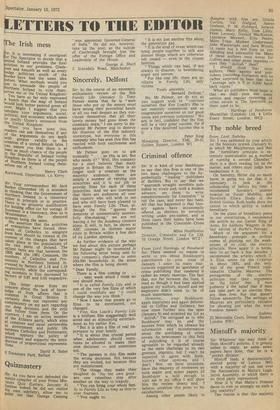The noble breed
From Lord Sudeley Sir: I was saddened by your article on the honours system (January 8), in which Mr Macpherson said that the "hereditary principle is extremely questionable as a method of running a second Chamber." Here is a short reading list on the matter, and others must judge how tendentious it is.
On heredity, Hitler did so much harm in going too far that it is necessary to look at the scholarship of before his time. I recommend Sorokin's pioneer treatise on Social Mobility, and Havelock Ellis's Study of the British Genius. Both books show the extent to which ability is indeed hereditary.
On the place of hereditary peers in our constitution, I recommend the article by our Garter King of Arms, Sir Anthony Wagner, in the last edition of Burke's Peerage.
Much of the argument for a hereditary principle in politics comes of pointing out the weaknesses of its rival, the elective principle. Here again it is necessary to go: back a few decades. I recommend the articles which T. S. Eliot wrote for the Criterion in about 1930, and the writings of the great French traditionalist Charles Maurras. The protagonists of the elective principle rest their arguments on the belief that if men guments n the belief that if men can take part in an election they are then free. But that doesn't follow necessarily. The writings of Maurras are particularly valuable for showing just what the word freedom means; Sudeley 25 Melcombe Court, Dorset Square, London NW1










































 Previous page
Previous page